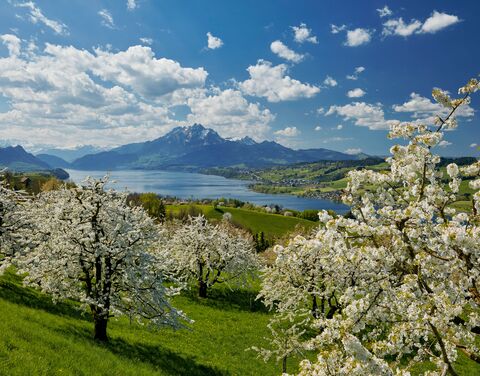
A diverse and healthy nature is vital for humans to survive. In the interview, Thomas Hügli, Sustainability Manager at AXA Switzerland, describes the status of biodiversity in Switzerland and what every one of us can do to better protect it.
Mr Hügli, how important is biodiversity?
It's incredibly important, a fact that is often underestimated. Biodiversity secures the basic needs for mankind, such as clean water, pure air and fertile soil. Functional biodiversity also has a positive impact on the climate as it removes carbon from the atmosphere and stores it. Then there is the spiritual importance of biodiversity - the beauty of nature gives us strength and enjoyment and this is worth protecting.
Finally the economic dimension is also important. For Switzerland alone, Agroscope researchers already estimated a few years ago that the pollination services of bees and hoverflies had a financial value of around CHF 350 million p.a. And that is only one aspect. In other words, without the services of nature, we wouldn't be able to produce anything. There is also a growing awareness in the economy that we need to protect what we use.
What is the status of biodiversity in Switzerland?
Not good. In Switzerland, one square meter of space is being built upon every second - this equates to around ten soccer pitches every day. Today, around one third of species and half of habitats are under acute threat. Since 1850, around 90 percent of all wetlands have disappeared and moors (although protected by the constitution since 1987) also continue to decline both in quality and quantity.
What would we have to do to better protect biodiversity?
Recently, UN General Secretary António Guterres said that the defining task in the 21st century was to achieve peace with nature again. We must communicate the existential importance of biodiversity in a broader and positive way, create an understanding of its significance and beauty, and constantly raise awareness of this through experiences of nature.
I also think that it's important to address the challenges of networked nature at a political level and in a more inclusive way, rather than break down the issues into individual categories, such as climate, biodiversity or agricultural policy, with sometimes contradictory aims.
I am encouraged by the current Global Biodiversity Conference in Montreal. One of the conference's aims is to place 30 percent of land and sea under protection by 2030. If we were to succeed in this, it could become an expressive guiding star - equivalent to the 1.5 target for climate protection - that is catchy and easy to understand, reflecting a cause worth taking action for.
What can individuals do to support biodiversity?
Every one of us can easily help encourage biodiversity. For example, people can stop using pesticides in their own gardens, pile up leaves in the fall, or focus on native flowers and bushes. Other good examples would be membership of a conservation organization, or gifting such membership, taking part in clean-up days or tree-planting initiatives, as offered by many municipalities. And finally by voting appropriately.
How high a priority does biodiversity have at AXA?
The priority is constantly rising. Biodiversity enhances our focus on the climate in an ideal way, as they both strengthen each other in terms of their effect. For example, global warming promotes desertification which adversely affects biodiversity, whereas functional biodiversity has a positive impact on the climate by absorbing carbon from forests, oceans and moors. These two issues must therefore be considered and addressed together and this is what we're doing in our climate strategy. Ultimately it's about the early prevention of potential harm to mankind and minimizing damage to buildings and infrastructure. This not only affects us as property and casualty insurers, but also as health insurers.
To what degree?
Loss of biodiversity encourages zoonosis, i.e. diseases that can be transmitted from animals to humans. We were already aware of this before Covid 19 through bird flu and Ebola, for example. The decline in habitats places animals under stress and makes them more susceptible to disease. This is particularly tricky in animals that live close to humans such as rodents and bats. In other words, climate protection means protecting biodiversity and also protecting humans. We are all familiar with the economic losses triggered by Covid 19 through illness, loss of work and production - they were enormous.
What exactly is AXA doing to encourage biodiversity?
As a major real estate owner, we want to gradually cover the green spaces of our properties with more biodiversity. We have also launched the Flora Futura initiative for our 150th anniversary in 2025. For each of our approximately two million customers, we will enhance one square meter of land in Switzerland with biodiversity. In terms of our investments, we are excluding financial investments in companies and sectors that damage biodiversity and we will invest more in forest and upgrading schemes. Even AXA's own research fund is doing its bit by supporting different environmental and research projects at Swiss colleges and universities. Not least, we are committed at group level to protecting biodiversity and supporting corresponding initiatives. This includes developing and strengthening international frameworks such as the Finance for Biodiversity Pledge or the Taskforce on Nature-related Financial Disclosure.
What is your own personal wish for biodiversity?
I would like climate protection as well as landscape and biodiversity protection to be regarded inclusively and not played off against each other, as is sometimes the case at the moment. The fact alone that functional biodiversity could save up to 30 percent of all carbon emissions should be argument enough in this regard.